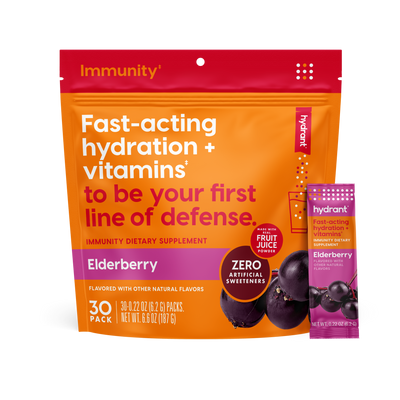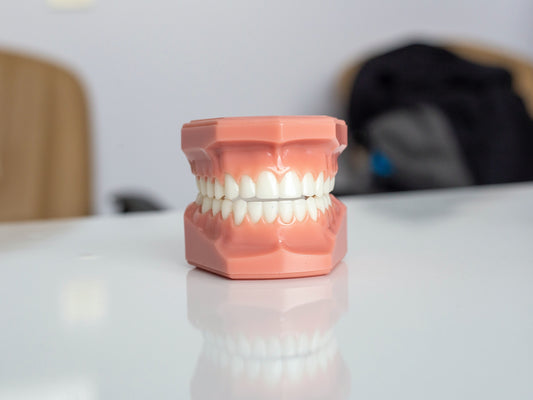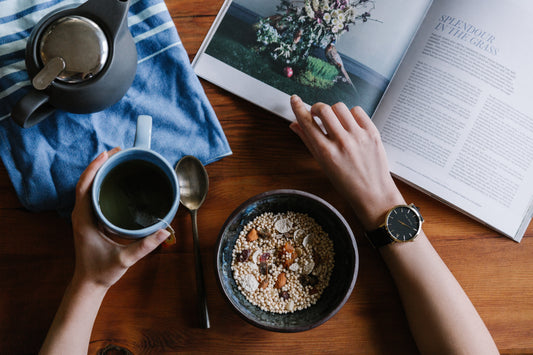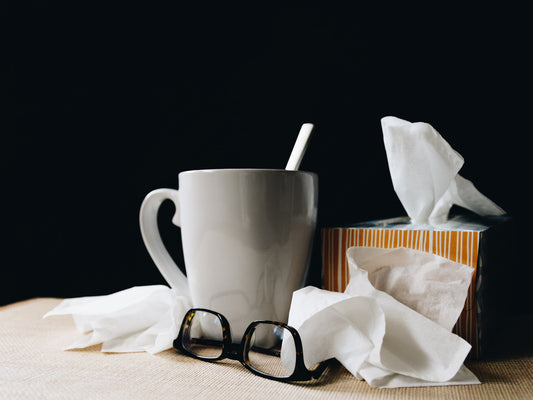There’s no magical “one size fits all” remedy to being sick, but there are many great ways to improve immune function. These include, but are not limited to, eating a well balanced diet, adding supplements to your routine, avoiding cigarette smoke, relaxing, and staying hydrated.
We break down each category into greater detail to help you craft your daily routine for enhanced immune support. Read on to learn more.
Whether you experience coughing, vomiting, body aches, or even just the sniffles, being sick is never fun. One of the best ways to avoid infection is by minimizing contact with infectious agents, such as bacteria and viruses. We do this by disinfecting surfaces, handwashing, using antibacterial gel, social distancing, and wearing masks. But sometimes, coming into contact with infectious bacteria and viruses is beyond our control. Being exposed to an infectious agent doesn't always equal infection, however. With a strong immune system, your body can fight off potential invaders without you becoming sick.
There are additions and changes you can make in your daily routine to help increase immune support. Note that these recommendations are not intended to treat, cure, or prevent any illness. If you’re not feeling well, please consult with your primary care provider.
Eat a Balanced Diet
Eating a well-balanced diet is important to help maintain a healthy immune system. Researchers have examined past studies to identify foods that are most likely to help promote health and immune balance.[4]
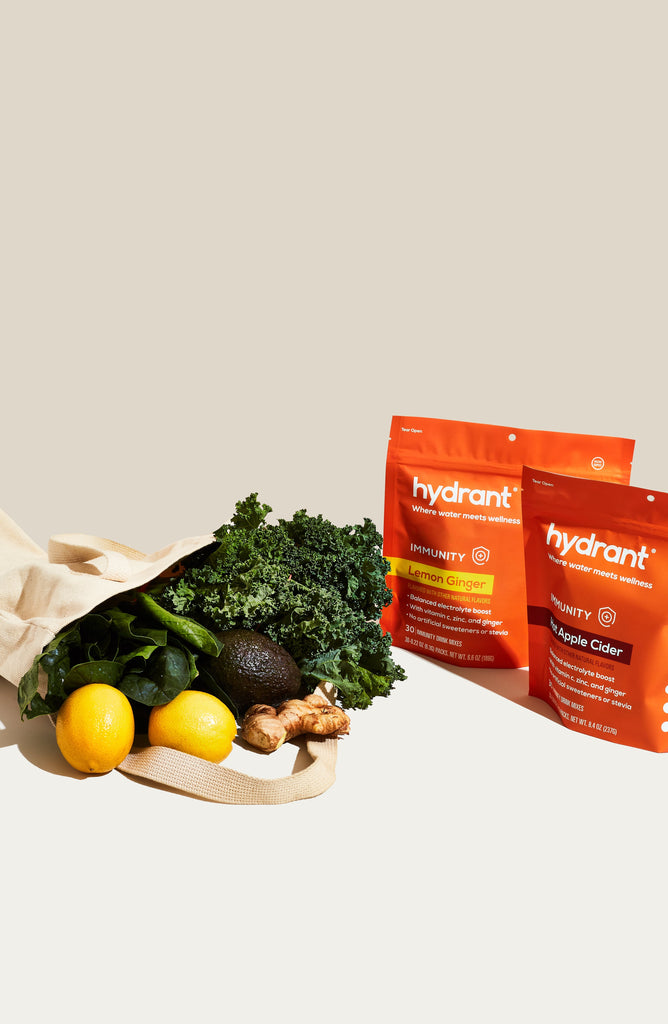
The review of studies determined that a balanced immune system is promoted by a balanced diet that contains adequate amounts of:
- Protein
- Fat
- Fiber
- Vitamins A, B, C, D, E
- Minerals iron, zinc, and selenium
- Polyphenols and carotenoids
One way to make sure you have a balanced diet is to follow the Dietary Guidelines for Americans created by the United States Department of Agriculture (USDA). [5] According to these guidelines, a healthy diet includes:
- A variety of vegetables
- Whole fruits
- Whole grains
- Fat-free or low-fat dairy
- Protein, such as meat, beans, nuts, and soy
- Healthy oils
The USDA also recommends that people limit their consumption of certain foods, such as:
- Saturated and trans fats
- Added sugar
- Sodium
- Alcohol
Take Supplements
Experts have gone back and forth trying to determine whether or not supplements help with immunity for years. Some view supplements as a cure-all, while others claim they're useless. The reality is probably somewhere in-between.
Instead of buying supplements that claim to boost immunity, closely read their labels instead. Some vitamins and minerals are more integral to immune support than others, and not all supplement marketing claims can be trusted.

Researchers reviewed past studies to identify potential supplements that could help boost immunity to COVID-19. [6] After reviewing research related to past similar illnesses, the study authors identified the following nutrients as possibly protective against COVID-19:
- Vitamin C
- Vitamin D
- Vitamin E
- Zinc
- Selenium
- Omega 3 fatty acids
The researchers state that adequate levels of these vitamins and minerals are required to protect people against COVID-19. Since more research is needed to discover the optimal dosage, they recommend that people adhere to the government's recommended daily amounts of each nutrient for now.
The U.S. Food and Drug Administration outlines recommended daily values for all vitamins and minerals. [7] Anyone who isn't reaching those daily values through their diet should consider supplementation.
Multiple individual studies have demonstrated that supplementing with certain vitamins and minerals can boost immunity. Studies have found that:
- Vitamin C reduces the duration of a cold and the severity of cold symptoms in both adults and children [8]
- Zinc also reduces the duration of the common cold [9]
- Vitamin D reduces the risk of catching a respiratory infection [10]
- Vitamin E reduces pneumonia incidence in elderly males [11]
One problem with traditional supplements is that they often come in pill form and lead to what’s called “pill fatigue” where it becomes a chore to swallow the various supplements or vitamins as you take them. There is increasing interest in products where the experience of taking the vitamins is much more pleasant!
Avoid Cigarette Smoke
Inhaling cigarette smoke affects the human immune system in a variety of ways.[12] Smokers may face an increased risk of contracting respiratory infections. When they do contract an infectious illness, they can experience more severe symptoms than non-smokers.
If you don’t smoke, it’s still advisable to avoid situations where second-hand smoke might be present, which can also impact one’s immunity.[13]
Sleep
Research shows that our immune systems are closely linked with our circadian rhythms.[14] Sleep and immunity engage in "cross-talk," which means they both influence one another. Immune responses influence sleep, which is why we often require more sleep or have trouble sleeping when we're sick, depending on the illness.
The effect also goes the other direction. Long-term sleep deprivation can lead to chronic low-grade inflammation, which weakens the immune system over time. Less sleep is also associated with being more susceptible to the common cold.[15]
A great first step in boosting and maintaining immune strength is good sleep. The recommended amount of sleep varies by age, but for most adults, it is 7 to 9 hours per night, and some of our immune responses are at their highest while we sleep.[,16,17]
Maintaining good sleep hygiene can help you get enough sleep each night. Good sleep hygiene means following certain practices, such as going to bed at the same time every night, keeping your bedroom dark, keeping electronics away from your bed, and more.[18]
Relax
Relaxing feels good, and it can also keep your immune response balanced. Win-win!
People who experience chronic stress are more likely to contract a cold when exposed to the virus than those who have not recently experienced chronic stress. [19] Long-term stress increases inflammation in the body and wears down the immune response.
There are many ways to reduce your stress. If chronic stress is an issue for you, consider:
- Exercising regularly
- Talking to a therapist
- Meditating
- Spending time in nature
Stay Hydrated

Staying hydrated is a good strategy for maintaining balanced immunity. Drinking water promotes good health in general, positively affecting gastrointestinal, kidney, and heart function. [1] Since the body's systems are interconnected, increasing health in one area improves other areas, such as the immune system.
Not drinking enough water is also connected to urinary tract infections in both children and adults. [2, 3] Although more research is necessary to better understand the connection between hydration and immunity, it's clear that one exists.
We launched our Immunity product line to help customers not only stay hydrated, but also meet their daily wellness needs. Our products have a balanced electrolyte boost and over 1000mg of Vitamin C, as well as ginger, zinc, and B Vitamins for additional immune system support. Check out our two new flavors, Lemon Ginger and Hot Apple Cider, for an immune boost for your daily routine.
Takeaway
Maintaining a strong immune system starts with basic hygiene. It’s important to wash your hands regularly, sanitize surfaces, and wear a mask. Keystone habits like staying hydrated, getting enough sleep, eating a balanced diet, and managing stress are also great ways to boost your overall immune system. Adding these habits into your routine can help you maintain strong defenses—no matter the season.












